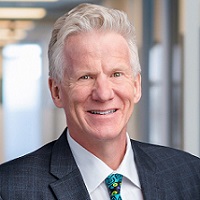 By Nick van Terheyden aka Dr Nick, Principal, ECG Management Consulting
By Nick van Terheyden aka Dr Nick, Principal, ECG Management Consulting
Twitter: @drnic1
Host of Healthcare Upside Down – #HCupsidedown
I am deeply grateful for the scientists, physicians, and researchers who have personally influenced me to take a more proactive approach to my health over the years. Many people rely on their primary care physician to give them trusted medical advice. But since I spent much of my early adult life on the move from country to country, I had little consistency in that type of relationship.
In my case, I’ve been fortunate to meet a number of extraordinary people along my journey of working in healthcare whose expertise I’ve relied on—people who are forward thinking and insistent on moving past the status quo to provide better care and outcomes.
Episode NOW on Demand
In my own personal world, my own father had experienced cardiac disease. Thankfully, he survived some major challenges, including an emergency bypass operation. With that family history and experience, I was particularly attuned to preventive care and risk factors. But in the pre-internet era, I was highly dependent on the knowledge of those around me, and I commenced a journey of heart disease monitoring and prevention that has so far kept my heart in good shape.
As we explore heart disease prevention as part of American Heart Month, we need everyone to have access to the insights and progress being made at the frontiers of heart disease. We have done a reasonable job of expanding our collective understanding of cholesterol and lipids, which are measured as part of regular check-ups. But as the Clash famously declared in a 1982 song….know your rights.
Or as this week’s guest would say, know your numbers. C. Michael Gibson, MD, is an interventional cardiologist and a professor of medicine at Harvard Medical School, and he argues that patients deserve to know more about their risk factors for heart disease. “I’m an interventional cardiologist, but I’m trying to put myself out of business trying to prevent the disease I treat,” he says.
On this episode Dr. Gibson tells us what we need to know about our own cardiac health. Below are a few excerpts.
New lessons about the “bad” cholesterol.
“We’re learning more and more about both the bad cholesterol and the good cholesterol. There’s LDL—that’s bad cholesterol. But then there’s some other bad cholesterol, something called Lp(a). And what we’re learning is that even if you have good management of LDL, 20% of us have an abnormality in Lp(a), and we don’t know about it. We’re also learning that this isn’t something that just happens when you’re 60. This is a lifetime disease. And not only is lower better, but probably longer is better when it comes to managing this stuff.”
Advocate for yourself.
“Don’t be afraid to ask. You are the consumer, and you deserve to know what your risks are. Know your LDL number. Know your good cholesterol number. One of the biggest setbacks we’ve had is that some of the guidelines a few years back said, the numbers don’t matter, you don’t need to treat to a target. In my judgment, that was a horrible misstep. Even my own doctor was citing misinformation, saying no, you don’t really need to get it down that low. And I actually provided him with articles showing that the lower your LDL, the lower your risk. My general philosophy is, do all you can to get [LDL] down as low as possible if the patient’s tolerating the medicines they’re on. So, advocate for yourself. If your doctor won’t put you on some medicines to get your LDL down, maybe it’s time to think about a different doctor.”
Obesity and heart health.
“I think obesity has been treated as a moral failing. It’s not; it’s a complex disease. There’s no shame [in being] obese. We’ve got to get people treated more aggressively to stem this ‘diabesity’ epidemic. [We need to] get people’s weights under control, get their diabetes under control, get their blood pressure under control, get their lipid levels down. I see obesity as the core of where we need to focus a lot of our efforts. Know your numbers, know your weight. Try and get it down. Go to the doctor to get some help to get it down. If you have diabetes, know your numbers. If you have high cholesterol, know your numbers.”
This article was originally published on the ECG Management Consulting blog and is republished here with permission.
About the Show
The US spends more on healthcare per capita than any other country on the planet. So why don’t we have superior outcomes? Why haven’t the principles of capitalism prevailed? And why do American consumers have so much trouble accessing and paying for healthcare? Dive into these and other issues on Healthcare Upside/Down with ECG principal Dr. Nick van Terheyden and guest panelists as they discuss the upsides and downsides of healthcare in the US, and how to make the system work for everyone.
Tune in weekdays at 9am, 5pm, and 1am ET.
Join the conversation on Twitter at #HCupsidedown.
